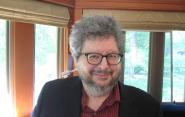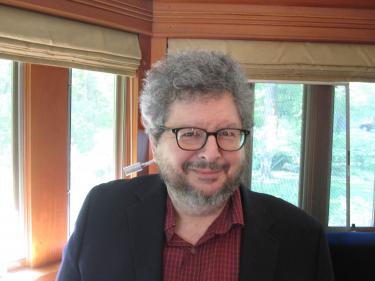What Is The Mind? A Computer Scientist Looks To Literature For Answers

The question of what exactly the mind is has tantalized scientists and philosophers for centuries. Some computer scientists approach the question by creating programs that perform traditionally human activities, like playing the game Go (recently, very successfully).
 In his new book, Tides of Mind, Prof. David Gelernter, who has taught Computer Science at Yale since 1982, takes a decidedly unscientific approach. He relies on the writings of Shakespeare, Kafka, Rilke and other writers and philosophers for their insight into human thought. These writings, along with his observations of "the dramatic differences in the way the same person behaves cognitively over the course of the day," led Gelernter to his theory on the "spectrum of consciousness." The most sophisticated software can do some incredible simulations of human behavior, he said, but it will never replicate consciousness. It might seem an unusual conclusion from someone who has created some very sophisticated artificial intelligence (AI) software in his career. It's less surprising, though, when you consider that he's also a frequently exhibited painter who has long taken a very human approach to his work. We spoke with him about Tides of Mind.
In his new book, Tides of Mind, Prof. David Gelernter, who has taught Computer Science at Yale since 1982, takes a decidedly unscientific approach. He relies on the writings of Shakespeare, Kafka, Rilke and other writers and philosophers for their insight into human thought. These writings, along with his observations of "the dramatic differences in the way the same person behaves cognitively over the course of the day," led Gelernter to his theory on the "spectrum of consciousness." The most sophisticated software can do some incredible simulations of human behavior, he said, but it will never replicate consciousness. It might seem an unusual conclusion from someone who has created some very sophisticated artificial intelligence (AI) software in his career. It's less surprising, though, when you consider that he's also a frequently exhibited painter who has long taken a very human approach to his work. We spoke with him about Tides of Mind.
The book focuses on your theory of the 'spectrum of consciousness.' What is that?
When consciousness is high at the top of the spectrum early in the day, we tend to focus on the external world. Information from our own minds – our memories and our ideas - don't dominate our thinking. When I'm trying to solve a problem rationally, I remember what I need to. I remember facts, numbers, methods. I don't remember my picnic at the beach three summers ago. My attention is focused on the external world - reality.
But as I lose my mental energy, I move down the spectrum, and what we see is that our attention shifts from outside to inside, less on the external world and more on our own mind. [At this end of the spectrum] a person is thinking about his own thoughts. His own ideas, memories, and fantasies are more the focus of his attention. At the very bottom, your focus is almost entirely on the inner world, just as at the top of the spectrum, it's almost entirely focused on the outer world.
How is that related to your work in computer science?
There was an AI project we were working on in this department [in the 1990s] about software and how to get it to do certain things. The software had a dial that allowed you to change the focus of the program. At maximum, it attempted to think rationally. It had a fake memory and chained things together based on relevance and logical coherence. As its focus lowered, the program would approach something like free association. The demo was fine as it went and what it did was surprisingly mind-like. But it did very little. It dealt only with memories [taken from a travel guide]. But I realized that if you really wanted an artificial intelligence, it wasn't enough to study rationality, reasoning, and informal logic, because that was only the very top edge of the spectrum. You needed a spectrum that was able to slide through a continuous palette, from almost exclusively thinking to almost exclusively feeling.
Not that an AI program can't do useful things without the spectrum - there are all sorts of tremendously valuable AI programs, but if you are really interested in the fundamental and theoretical sense of software that really imitates the human mind, you couldn't do it without the spectrum.
This is a minority opinion in your field. Why is that?
Reasoning plays a small role in human cognitive life, but it plays a huge role in the way many scientists and many computer scientists, and technologists and philosophers think about the mind. We're all really human and we tend to put a high value on what we're capable of doing and what we do for a living, so it's natural that a philosopher would put a high value on reasoning and rationality. But as far as I'm concerned, many such people have an inflated sense of the role of rationality and reasoning in human life.
Have you heard from any of your peers about the book?
When you introduce something that is a new and different point of view, the only rational expectation is that it will be ignored by almost everybody - and rejected by almost everyone who doesn't ignore it. I don't expect a lot of converts, but I've been surprised at the amount of interest I've seen.
The book is wildly unorthodox, not only in its theory but in its method. It's based on the hypothesis that if you want to know what's going on in the human mind, the people who know it are poets and novelists. The best experimental psychologist in the world can't get close enough to the inner human mind to tell us how it works, but Shakespeare knew all about it. So given that, I've been very impressed with how tolerant the field has been – how willing the field has been to say 'Well... maybe. I'll think about it.' It doesn't mean that everybody's saying 'Great, you're right' - but people seem to be of a more open mind than I would have predicted.
To what extent is your background in the arts and humanities part of this dissident viewpoint?
If I look at it from the outside, psychologically, I would probably say it has a lot to do with it. I went into computer science partly because I admired my father [AI pioneer Herbert Gelernter] and I'd always been familiar with computing since I was a child. But it was also the case that it seemed to me that a man had a religious obligation to learn something useful in the world to make a living and support his wife and children. And computer science seemed like it would be useful.
My natural tendencies are in a very different direction. My natural tendency is to be a painter. I wouldn't have said this as a young man or as a young professor, but today, I have to say that yes, I brought a different kind of mind into the field. It's biased in a different direction, so it's not surprising that I don't agree with most people.
What do writers have to say about the mind, and is there a common thread among those you draw from?
Hemingway might have a sharp comment, let's say, about how the mind behaves at twilight when you're beginning to get sleepy. It's been a long day, but you're still paying attention. Whereas Shakespeare addresses the question of how you think when you're deeply depressed but you're still sharp. Now it's absolutely true that the worldview of Hemingway is very different from the worldview of Rilke or Kafka, let alone Shakespeare, who wrote in a different medium and a different century - or Moliere, who wrote in a different medium, different century and different language. They definitely have different views of the mind. Nonetheless, they are all honest. I trust them all equally. Hemingway has a narrower range than Shakespeare, who has the entire cosmos as his range. But, nonetheless, Hemingway is as honest, and as good of an observer within his limited range as Shakespeare or Tolstoy.

